When John Huston’s crew arrived on the island of Tobago in September of 1956 to begin filming his new picture, Heaven Knows, Mr. Allison, 20th Century Fox were hoping that it would repeat the massive success of The African Queen – another story about a mismatched couple stranded in the wilderness, pitted against a well-armed enemy in a backwater of a global war.
It was a war picture, but a decade since World War Two had ended these had gone from propaganda pictures (Bataan, Destination Tokyo) to gritty dramas full of battle scenes (Battleground, 12 O’Clock High) to adventure pictures with a wartime setting (The Desert Rats, The Colditz Story) to whatever Heaven Knows, Mr. Allison was supposed to be. Like The Caine Mutiny or The Man Who Never Was, it was a drama whose stakes were raised by wartime, but more about characters than victory in any campaign or the success of any mission.
And at a time when you could count on your audience containing at least a few veterans of the last war, it was the sort of serious picture a generation who had lived through that war wanted to see and show to their families. And it was the kind of film that won Oscars – like The Bridge on the River Kwai, released the same year as Huston’s film. Its star, Robert Mitchum was making his bread and butter appearing in war films like The Enemy Below, The Hunters, The Angry Hills and The Longest Day over the next five years.
The film begins, after telling us that it’s 1944 and that we’re “somewhere in the South Pacific”, with Mitchum, alone and adrift on a rubber raft, being slowly washed ashore on an isolated island. His fatigues and boots and the way he warily comes ashore with his ka-bar knife at the ready tell us he’s a U.S. Marine. The white habit and wimple on Deborah Kerr – the only person on the otherwise deserted island – tell us she’s a nun.
Once acquainted they tell their stories. Corporal Allison (Mitchum) was in a scouting party when the submarine taking them ashore was fired on; the sub dived and left the Marines in the water. Allison found the raft and climbed aboard, apparently the only survivor. Sister Angela (Deborah Kerr) accompanied an aging priest to help evacuate another priest at the church and mission on this island; when they arrived they found it deserted, then were stranded there after the natives who sailed them there fled in terror of the Japanese who had taken the priest and the inhabitants of the little mission village. The old priest died a few days later.
It’s an economical setup, dispensed with neatly by Huston and screenwriter John Lee Mahin (The Bad Seed, Mogambo, Show Boat), and once established we’re not troubled by its particulars again. There’s just this man and this woman, alone, hoping for rescue but knowing that if it comes it’ll be because the war has found them again out here in this lonely spot.
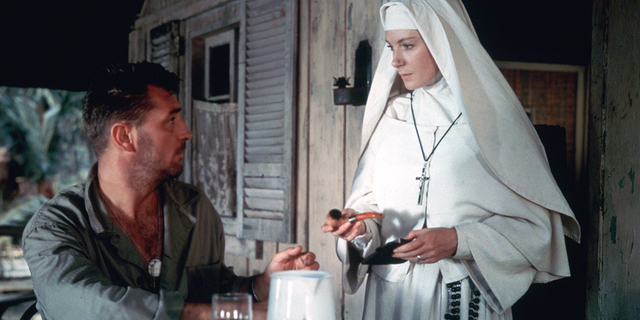
It was a film that neither Huston nor Mitchum wanted to be doing. Typical of his career trajectory, Huston had just exhausted himself with an expensive passion project (Moby Dick) and needed money. It was expensive to be John Huston – he was living well beyond his means as lord of the manor at his estate in Ireland and took on a series of films that biographers like Jeffrey Meyers, author of John Huston: Courage and Art, consider compromised, the first of which was Heaven Knows, Mr. Allison. (“A soppy title,” Meyers writes.)
Mitchum thought his days of being forced to do films by a studio were over, but his agent had signed him to a two-picture deal with Fox, and he learned while shooting in London for Fire Down Below that he had to report to the set in Tobago in just a few weeks. He’d just been in Tobago filming the exteriors for Fire Down Below – four months during the rainy season where he discovered calypso music in his abundant spare time, which turned into a side career, producing an album for Capitol Records, Calypso…Is Like So, that would become a collector’s item years later.
Heaven Knows, Mr. Allison was made with a British crew to qualify for funds from the Eady Levy that taxed box office money made by U.S. studios like Fox in the U.K., meant to help fund the British film industry. The film was based on a novel by Charles Shaw, an Australian journalist, that Huston thought too raunchy, so he and Mahin toned it down despite protests by one of the producers, Eugene Frenke, who wanted to see more sex in the relationship between the Marine and the nun.
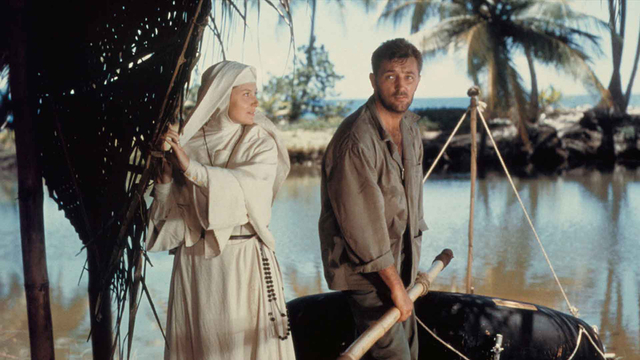
Mitchum made the mistake most people did with Kerr and assumed that her elegant, proper onscreen persona matched the real person, and was pleasantly surprised that it didn’t. Kerr, wrote Mitchum’s biographer Lee Server in Robert Mitchum: Baby I Don’t Care, “became Bob’s great platonic love. He would speak of her ever after as his all-time favorite actress and ‘the only leading lady I didn’t go to bed with’ – an exaggeration in any case, but meant somehow as a compliment.”
At first Corporal Allison and Sister Angela cope with their exile together on the island by comparing their mutual vows. Allison, a career Marine, is a barely educated orphan who found his home and purpose in the Corps, whose calls to duty anywhere and at any time has made him unsuited to a domestic life.
Mitchum’s own life wasn’t too different from Allison’s – a runaway at 14, he rode the rails and ended up on a chain gang after being arrested for vagrancy. He worked in the Civilian Conservation Corps and boxed professionally before ending up in Hollywood, making a roundabout way into the movie business while working night shifts at Lockheed Aircraft. He didn’t spend time in uniform during the war, but a man like Mitchum – forty years old when Heaven Knows, Mr. Allison was released – would have been one of the “Old Breed” when the war broke out, the backbone of the Corps while it filled up with recruits.
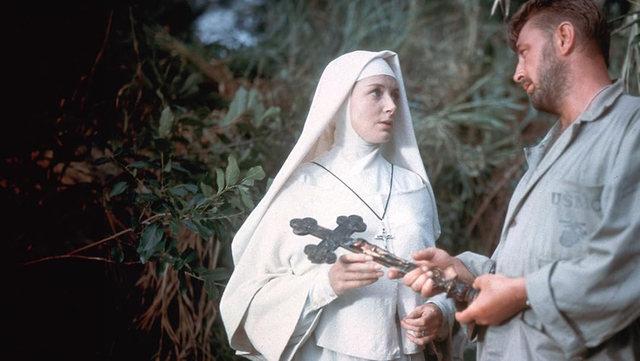
Allison is, in his own description, “a big dumb guy” who doesn’t know if a turtle is a fish or the meaning of the word “gourmand”. Mitchum based him on Tim Wallace, his stand-in, who had worked with him since 1948 and would still be doubling for Mitchum in the ’70s. As unchurched as he’s unschooled, Allison has a hard time conceiving of the devotion that would move Sister Angela to take holy vows – though that’s never been a conundrum limited to the uneducated.
Sister Angela on the other hand has the sort of faith that might get mistaken for simple because it’s so uncomplicated. The Scottish-born Kerr plays her with what’s uncomfortably too much like a stage Irish accent, but making her Irish would have been a no-brainer as the Irish were in recent memory once considered the most devout Catholics in Europe – one of those many things that are no longer true.
After losing Allison’s raft and realizing that the American military’s island-hopping strategy means they might never be rescued, the Marine reasons that, without a war or the Church, their vows to the Corps and Rome lose their context and meaning. The island has abundant food and water; it’s a kind of Eden, so it would seem that their new purpose in life is to become its Adam and Eve.
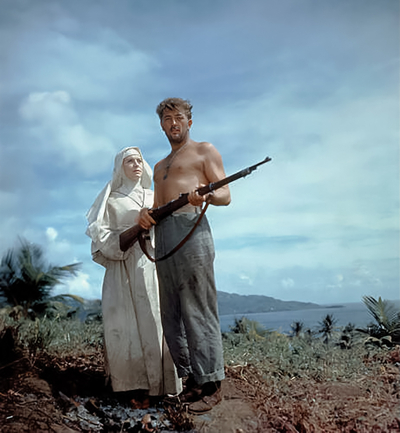
There’s something about vows of celibacy that fascinates and confounds us. Allison gets drunk one night and seethes about being so luckless as to be stranded with a beautiful young nun: why couldn’t she have been old and ugly? When he discovers that she’s still a novitiate, a month away from taking what would have been her final vows, he pleads with her to change her mind.
In Charles Shaw’s original novel Sister Angela is as troubled by lust and desire as Allison. There was apparently a version of the script where Sister Angela wasn’t a nun at all but had stolen the habit to disguise herself. In the end, though, Huston couldn’t bring himself to make the more salacious version of the story despite producer Frenke’s insistence, and he had co-producer Buddy Adler, head of production at Fox, to back him up.
Perhaps the Romans fantasized about the Vestal Virgins; Catholic nuns have certainly been the subject of lurid speculation for centuries. Wars of faith during the Reformation certainly produced plenty of protestant propaganda about unseemly goings-on in convents, which became a trope in gothic horror, inspired Aldous Huxley to write The Devils, and thrive today as a venerable cliché in pornography.
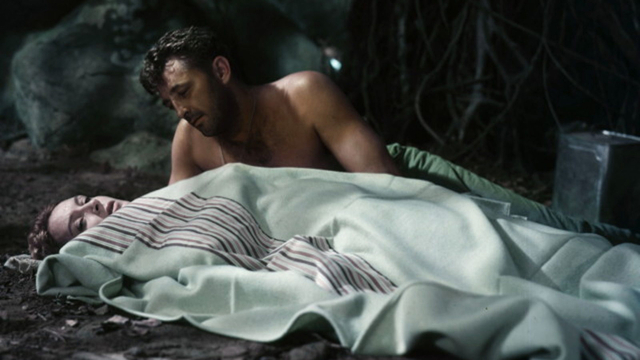
I’ve always been fascinated at how confused and uncomfortable nuns make both atheists and non-Catholics – more reliably than priests or monks who, after all, are supposed to have taken the same vows of celibacy. I will always remember watching PBS stalwart Bill Moyers (a Southern Baptist with a theology degree) interview Sister Wendy Beckett at the height of her celebrity as an art critic and being as baffled as Germaine Greer that this celibate nun could be so appreciative of the sensuality of Renaissance art. His discomfort – and her blithe dismissal of such prudishness – was marvellous to watch.
While John Huston professed no religion, he chose to live in Ireland at the height of its Catholicity and had his daughter Angelica baptised in the Church. He directed a reverent adaptation of the devoutly Catholic Flannery O’Connor’s Wise Blood; he even played an archbishop in Otto Preminger’s film The Cardinal. In any case Huston held out against attempts to inject any hint of mutual carnality into the relationship between Allison and Sister Angela.
He did, however, happily defend his picture against attempts to censor it by the Legion of Decency who sent a priestly official to the set to observe production and began demanding changes. Huston invited him to watch the filming of one scene – rumoured to exist though no footage has ever surfaced – described by Lee Server in his Mitchum biography:
“Huston greeted the priest and then called for ‘Action’. Director and crew were deadpan as Bob and Deborah spoke their lines, then moved closer together, Mitchum sliding his hand under nun Kerr’s breasts while she cupped his buttocks and they began to kiss with open-mouthed abandon. The Legion of Decency’s man’s eyes widened, he grasped at his heart and screamed ‘What is going on there?!'”
“‘No talking, Father,’ said Huston. ‘Dammit, now you’ve gone and ruined a perfectly good take.'”
It’s such a good story that you can’t help but hope it happened.
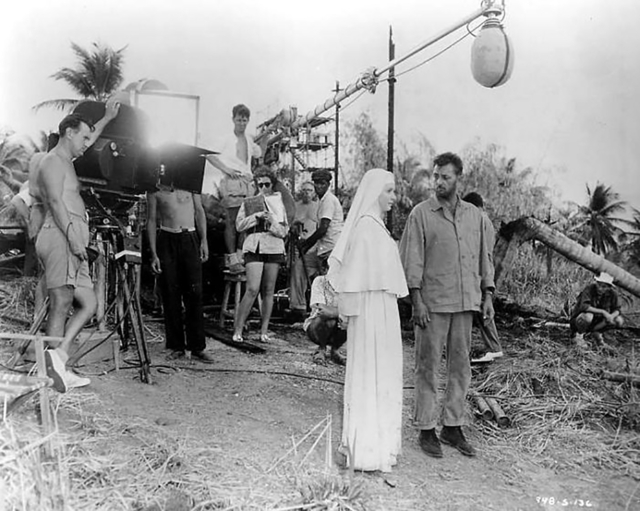
As the conflict between Allison’s desire and Sister Angela’s devotion is really the core of the picture, it’s not surprising that the war seems like a comparatively minor thing when the Japanese finally return to the island to set up a weather station, then fortify it against American invasion. For a while the soldier and the nun watch the war at a distance – flashes of light on the horizon, which Allison describes as having “two-dollar seats to a Joe Louis fight.”
Huston had a hard time casting his Japanese invaders; he was able to find some Japanese immigrants working on a farm in Brazil, but made up the rest of the troops with Chinese from nearby Trinidad. The U.S. military, though, helpfully provided a hundred actual Marines for the final battle.
It’s hard not to notice that, just over a decade since the war ended, Huston has no interest in depicting his Japanese soldiers as sinister or sadistic. In a scene where Allison is forced to hide in a storeroom while two men drink saké and enjoy a few games of Go, they’re seen as mere men, bored and desperate to make the best of the endless lulls between drills or action.
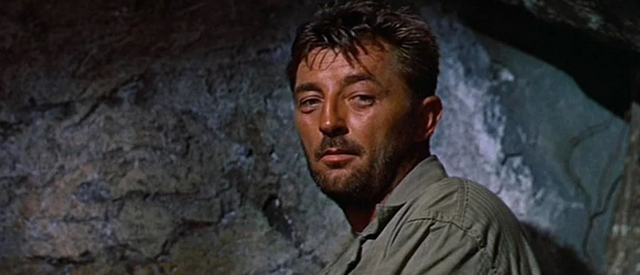
Mitchum, however, didn’t escape the attention of a few of the Marine extras. While having drinks with his wife Dorothy in the bar of the Blue Haven Hotel one evening (it’s still in business), he had to deal with some men in uniform who decided to test their toughness against a famous movie tough guy.
It didn’t end well for the Marines, and Mitchum was threatening to toss the last man standing off a balcony into the wading pool below when his wife began hitting him with one of her pumps. According to Server he complained that she “was supposed to be on my side.”
“You were starting to enjoy it,” Dorothy replied.
Once again, it’s such a good story that you hope it’s true.
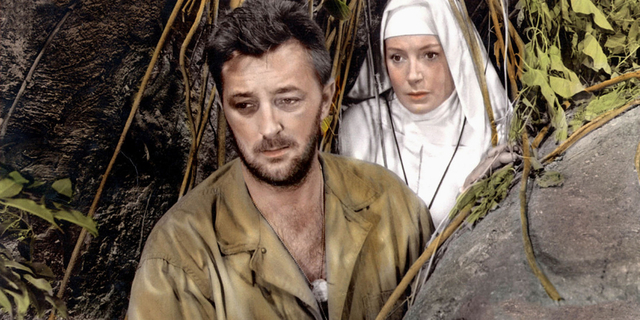
Heaven Knows, Mr. Allison is not counted among Huston’s best films, but considering how good his best work is, that’s hardly damning criticism. Jeffrey Meyers, in his biography of the director, is certainly not a fan, and writes that while “African Queen was fast-paced and dynamic, Heaven Knows is slow and sentimental, and Huston was unable to stamp his distinctive image on the story.”
Server is more appreciative, calling the picture “a beauty. It was a movie that was stripped to the bare essentials, but not a thing was lacking. It was funny, tender, exciting, visually enchanting, the empty blue sky and sea a soothing treat for the eye. Kerr was superb, and Mitchum, playing dumb as the good-hearted marine whose only knowledge of live is ‘the Corps’, gave a deceptively simple performance that was in fact a fully created characterization of inestimable grace and charm.”
I fall somewhere in between. While it’s certainly nowhere near as good as what I’d call peak Huston (The Maltese Falcon, The Treasure of the Sierra Madre, Beat the Devil, The Misfits, Under the Volcano, The Dead) I’d call it good work for a great director just coasting, and I applaud him for respecting the integrity of Sister Angela’s vows more than another director would have, and which nobody making the same story today would even consider.
Club members can let Rick know what they think by logging in and sharing in the comments below, as access to the comments section is one of many benefits that comes along with membership in the Mark Steyn Club.

